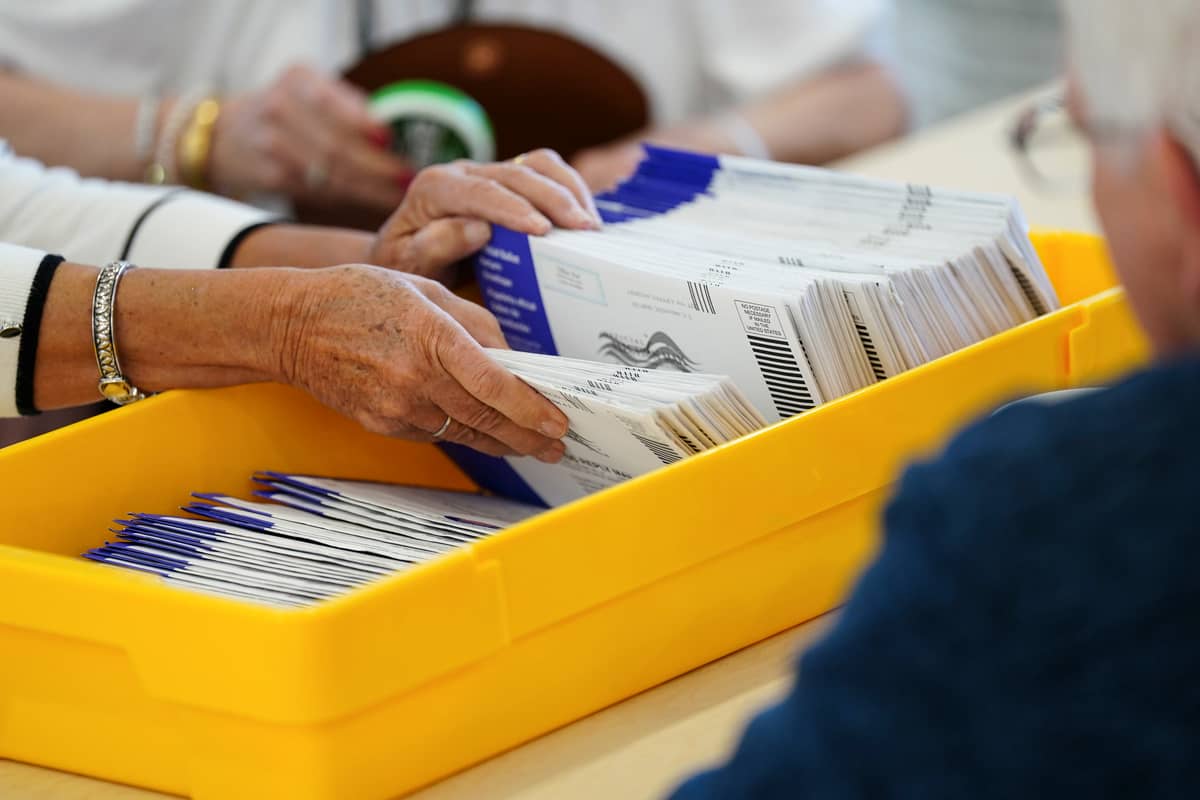This article is shared with LebTown by content partner Spotlight PA.
By Carter Walker of Votebeat
Voting rights groups are trying again to invalidate Pennsylvania’s requirement that voters write a date on their mail ballot return envelope, following a recent defeat in federal court.
The ACLU of Pennsylvania and the Public Interest Law Center filed a lawsuit in Commonwealth Court on Tuesday against Secretary of the Commonwealth Al Schmidt, this time arguing that the Election Code’s requirement that voters write the date on their ballot envelopes violates the state constitution’s clause on free and equal elections.
The suit marks a new front in the long-running effort by voting rights groups to invalidate the date requirement, which they argue needlessly disenfranchises too many voters each cycle.
The ACLU previously argued in a years-long federal case that the requirement violated the U.S. Civil Rights Act.
Under current interpretation of state law, county election officials must reject any mail ballot that lacks a date or has an incorrect date on its return envelope. Of the approximately 715,000 mail ballots returned by voters in April’s primary election, more than 4,400 were rejected for this reason. That number could greatly increase in November, when turnout is expected to be much higher.
“There are thousands of voters whose ballots are at stake,” said Ben Geffen, senior attorney at Public Interest Law Center. “People just really don’t like to think they followed the rules and, for some reason of red tape or some technicality, their vote doesn’t get counted. When that happens to you, it’s very upsetting.”
Pennsylvania’s state constitution affirms a right to vote
The ACLU and the Public Interest Law Center are suing on behalf of the Black Political Empowerment Project, POWER Interfaith, Make the Road Pennsylvania, OnePA Activists United, New PA Project Education Fund, Casa San José, Pittsburgh United, the League of Women Voters of Pennsylvania, and Common Cause Pennsylvania.
A spokesperson for the Department of State told Votebeat and Spotlight PA on Wednesday that the agency was reviewing the petition, but reiterated its view that the dating requirement is unnecessary.
“In the years of litigation over this issue, it has become irrefutably clear that the handwritten date serves no function in the administration of Pennsylvania’s election,” Matt Heckel, press secretary for the department, said. “As a result, the Department has consistently argued in court that voters should not be disenfranchised for failing to write or incorrectly writing a date that serves no function.”
The suit also named Allegheny County and Philadelphia as defendants.
Because the case is being filed against Schmidt — a state official — Commonwealth Court will hear the case initially, and a ruling there could set a standard statewide. Given the appellate court’s track record of expediting election-related cases, Geffen is optimistic that a decision could come in time for the November election.
When Pennsylvania passed its no-excuse mail voting law, Act 77, in 2019, it used much of the same language as the state’s absentee voting statute. Both laws require voters to write a date on their return envelope, and courts have interpreted that to mean that the date must be between the day the ballot was sent out and Election Day.
Counties reached varying decisions during the April primary about whether a lack of “24” in the partly pre-filled space for the year constituted an incorrect date, or if it was simply incomplete and could be counted under current case law.
As the use of mail voting expanded under Act 77, so too did the number of ballots rejected for lacking a proper date on the envelope.
The organizations involved in the lawsuit argue that under the state constitution, this requirement is invalid. The argument relies on a constitutional provision that says “elections shall be free and equal; and no power, civil or military, shall at any time interfere to prevent the free exercise of the right of suffrage.”
Geffen said this affirmative right to vote in the state constitution gives the challenge a better chance of success than cases brought in federal court, since the U.S. Constitution does not contain an affirmative right to vote.
“The state courts for decades have interpreted the free and equal election clause as overriding highly technical requirements in the Election Code that block people’s ballots from being counted,” he said. “I think that’s exactly the situation we see here.”
Pennsylvania’s appellate courts have already shown that they are amenable to this argument. In 2022, state and national GOP groups brought a case, Ball v. Chapman, against the Department of State over its guidance to counties that they should count undated or incorrectly dated ballots if they are received on time. Most of the Pennsylvania Supreme Court justices agreed that a challenge under the clause would succeed.
“Failure to comply with the date requirement would not compel the discarding of votes in light of the Free and Equal Elections Clause,” Justice David Wecht wrote in a footnote.
Derek T. Muller, an election law professor at Notre Dame Law School, said state courts have become more open to these types of challenges in recent years. However, even with provisions like Pennsylvania’s that affirm a right to vote, courts still need to weigh the interest of the state in setting rules to ensure elections run smoothly against the interest of voters to easily exercise their rights.
“Strictly speaking, any law abridges the right to vote,” Muller said. “For instance, if you say you only have 12 hours [to vote] or have to be a resident of that state for 30 days prior to the election.”
Still, the footnote in the Ball case “does seem to suggest plaintiffs have a really good shot here,” he said.
Commonwealth Court challenge could be ‘last remaining option’
The dating requirement has been continually challenged in court since Act 77 was implemented in 2020. Aside from the Ball case, litigants, including the ACLU, have primarily challenged the law in federal courts under a provision in the 1964 Civil Rights Act that was designed to ensure that voters weren’t denied the right to register to vote for reasons “immaterial” to their eligibility.
Several federal judges have sided with that argument, but in March a three-judge panel of the 3rd U.S. Circuit Court of Appeals ruled against it.
The ACLU, which brought that case on behalf of the NAACP and other voting rights groups, has not decided whether it will appeal that ruling to the U.S. Supreme Court, said Vic Walczak, legal director of the ACLU of Pennsylvania.
The ACLU is also asking the district court judge in the case to allow it to expand on another part of its argument, an equal protection claim, which the 3rd Circuit did not strike down in March.
But if both fail, the ACLU and Public Interest Legal Center’s new free and equal elections claim could be the only path left for legal challenges to the dating requirement, leaving only a legislative fix on the table. State lawmakers have put forward a number of proposals to eliminate the requirement, but none have made it through Harrisburg’s partisan deadlock.
Geffen said the organizations did not want to bring the new claim to Commonwealth Court while the NAACP case was still in the U.S. district and circuit courts.
”You don’t go to the ultimate backstop argument if there is a different solution that is available,” he said. “In light of that recent decision from the 3rd Circuit, this is the last remaining option to vindicate this right.”
WHILE YOU’RE HERE… If you learned something from this story, pay it forward and become a member of Spotlight PA so someone else can in the future at spotlightpa.org/donate. Spotlight PA is funded by foundations and readers like you who are committed to accountability journalism that gets results.
























